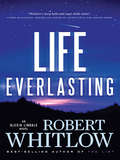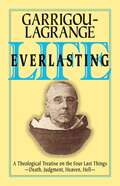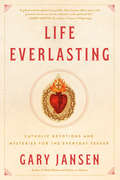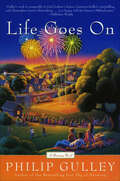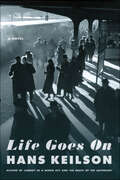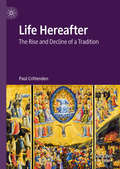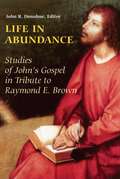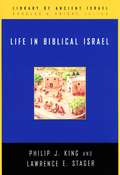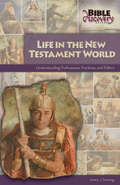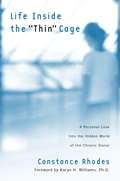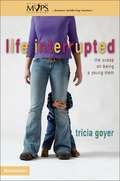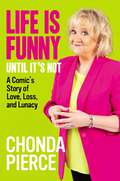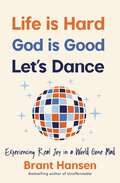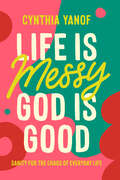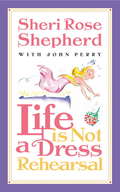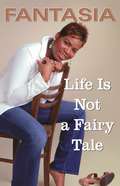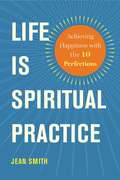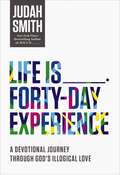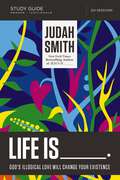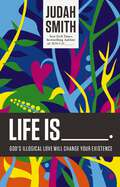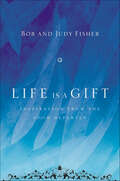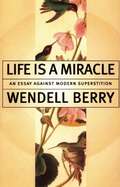- Table View
- List View
Life Everlasting
by Robert WhitlowWith her client's husband somewhere between this world and the next, attorney Alexia Lindale makes an everlasting choice.The youngest son of a family consumed by greed, Baxter Richardson lingers on this earth in a coma. His wife wants him dead to protect her secrets. His brother wants him dead to gain control of the family empire. And though Baxter's father fights to keep him alive, even he has ulterior motives.But Baster has a surprising ally. A classically trained painist, Ted Morgan believes music can be used as prayer. And Ted's divinely-inspired playing has been slowly pulling Baxter back from the brink of death.Attorney Alexia Lindale represents Baxter's wife, Rena, but has no idea that she and her client are being played in a game that has higher stakes than a single legal case.As Baxter grows stronger, the more endangered he becomes. As Alexia navigates her responsibilities to her client, her relationship with the gifted musician, and her new relationship with God, she must discern the truth as it pertains to life, death, and life everlasting.
Life Everlasting and the Immensity of the Soul: A Theological Treatise on the Four Last Things: Death, Judgment, Heaven, Hell
by Reginald Garrigou-Lagrange Patrick CumminsA serious, theological treatise on the Four Last Things - Death, Judgment, Heaven and Hell - but purposely written for the average reader. Shows the exalted "immensity" of the human soul and that only possession of God in the Beatific Vision can completely satisfy man's desires. <p><p>The author touches on many theological aspects that bear fruit on our final end - the roots of vice and virtue, the grace of a happy death, the pain of loss, the nature of eternal beatitude, and many more. An enlightening study of man's final destiny that will inspire the reader with its many insights.
Life Everlasting: Catholic Devotions and Mysteries for the Everyday Seeker
by Gary JansenThe time-honored practices in this inspiring book will guide you in unlocking the power of Catholic devotions— prayers, meditations, and even very simple, small actions you can take right now that will bring you closer to God and also offer reassurance that we are never, ever alone. The mystical practices of mindfulness and heartfulness presented can help anyone find solace, healing, and direction during difficult times. In Life Everlasting readers will discover that lost causes can be won by meditating with St. Jude; healings can occur by praying with the Virgin Mary; and the Holy Spirit can assist us in making important decisions. The Catholic art of devotion can help us experience miracles in all aspects of our daily lives including our health, finances, and relationships. By praying and taking our attention off our own problems for just a few minutes a day, we can take the first steps toward abandoning fear and living a life of forgiveness, abundance, and perpetual gratitude. In other words, we can experience a little heaven on earth, a little life everlasting.
Life Goes On: A Harmony Novel (The Harmony Novels)
by Philip GulleyA small-town clergyman tries to hold it together while tending to his eccentric flock in this cozy, comic entry in the beloved, bestselling series.“This is sweet, homespun storytelling, as comfy and reassuring as warm socks in a wet spring.” —Publishers WeeklySquarely in the crosshairs of the Church’s heresy hunters, can Pastor Sam survive?It’s a madcap year in Harmony, Indiana, as Sam Gardner struggles through his fourth year as pastor of the Harmony Friends Meeting. Join the thousands of readers who have fallen in love with the charming small town that hosts what BookPage calls “the biggest collection of crusty, lovable characters since James Herriot settled in Yorkshire.”“Life Goes On is a visit with old friends. . . . You’ll feel right at home.” —Indianapolis Star“Gulley is a splendid storyteller, and . . . his book abounds with shrewd insights into human character. . . . [A] quiet but insistent affirmation of compassion and forgiveness endows Life Goes On with the genuine spirit of the Gospels.” —Arkansas Democrat-Gazette
Life Goes On: A Novel
by Hans KeilsonPublished when the author was just twenty-three, Life Goes On was Hans Keilson's literary debut, an extraordinary autobiographical novel that paints a dark yet illuminating portrait of Germany between the world wars. It is the story of Herr Seldersen—a Jewish store owner modeled on Keilson's father, a textile merchant and decorated World War I veteran—along with his wife and son, Albrecht, and the troubles they encounter as the German economy collapses and politics turn rancid.The book was banned by the Nazis in 1934. Shortly afterward, following his editor's advice, Keilson emigrated to the Netherlands, where he would spend the rest of his life.Life Goes On is an essential volume for readers of Keilson's later work. At the age of one hundred, with his one copy of the first edition of Life Goes On in hand, Keilson told The New York Times that he would love to see his first novel reissued, and translated as well. "Then you would have my whole biography," he told them. He died at the age of one hundred and one.
Life Hereafter: The Rise and Decline of a Tradition
by Paul CrittendenIn this book, Paul Crittenden offers a critical guide to the problematic origins of biblical teaching about the afterlife and the way in which it was subsequently developed by Church authorities and theologians—Origen, Augustine, and Thomas Aquinas in particular. In the post–Reformation era the focus falls on the challenges set by modern secularism. The tradition encompasses a body of interconnected themes: an apocalyptic war in which the Kingdom of God triumphs over Satan’s powers of darkness; salvation in Christ; the immortality of the soul; and finally the resurrection of the dead and the last judgment, ratifying an afterlife of eternal bliss for the morally good and punishment in hell for wrongdoers. The critique questions these beliefs on evidential, ethical, and philosophical grounds. The argument overall is that what lies beyond death is beyond knowledge. The one fundamental truth that can be distilled from the once compelling body of Christian eschatological belief—for believers and unbelievers alike—is the importance of living ethically.
Life In Abundance
by John R. DonahueLife in Abundance: Studies of John's Gospel in Tribute to Raymond E. Brown, SS is a collection of essays, edited by John R. Donahue, SJ, which includes papers given at the "An International Conference on the Gospel of John: Life in Abundance, that was held at St. Mary's Seminary and University in Baltimore in October 2003, attended by leading Johannine scholars. The published essays cover the state of Johannine studies, Johannine theology, issues of interpretation, and a comprehensive bibliography of the writings of Raymond E. Brown, SS
Life In Biblical Israel
by Philip King Lawrence StagerThis special-edition volume of the Library of Ancient Israel, based on the latest research, presents a vivid description of the world of Ancient Israel, covering such topics as domestic life, the means of existence, cultural expression, and religious practices. With over 175 full-color pictures and illustrations,Life in Biblical Israelopens the door to everyday life in biblical Israel for all readers. This volume is perfect for classrooms, coffee tables, and personal use. <p><p> Volumes in the Library of Ancient Israel draw on multiple disciplines--such as archaeology, anthropology, sociology, linguistics, and literary criticism--to illuminate the everyday realities and social subtleties these ancient cultures experienced. This series employs sophisticated methods resulting in original contributions that depict the reality of the people behind the Hebrew Bible and interprets these insights for a wide variety of readers.
Life In The New Testament World: Understanding Professions, Practices and Politics (Bible Discovery Series)
by Armin J PanningWhat was life like during the time of Jesus?It’s easy to read references about this time period in the Bible and move on without really knowing what they mean. Just as a historical reenactment helps you understand what life was like for the people who came before you, this insightful book helps you step into the sandals of Christians who lived through the events you read about in the Bible! Life in the New Testament World will satisfy your curiosity about biblical history as it reveals the occupations, politics, routines, and customs of people living in the New Testament. By helping you understand their daily lives, this book will bring the characters of the Bible to life in a real and profound way for you!
Life Inside the "Thin" Cage: A Personal Look into the Hidden World of the Chronic Dieter
by Constance RhodesFrustrated by the often unrealistic standards of beauty presented by today’s media, many women have become trapped in a never-ending pattern of chronic dieting. Daily they endure destructive self-talk such as “I can’t eat that or I’ll get fat” or “If I could just lose a few more pounds everything would be better. ” Chronic dieters may be any shape or size but they have one thing in common: They are often left to suffer alone with an undiagnosed “sub-clinical” eating disorder. Such sub-clinical disorders include eating habits that are unusual, even unhealthy, but do not fit the technical classifications of anorexia or bulimia. Addressing the many dimension of “chronic dieting,”Life Inside the “Thin” Cageoffers a wake-up call and practical steps to those who need healing. Readers will find personal stories, insights into their secret patterns and habits, reassurance that they are not alone, checklists, self-tests, and, best of all, a new road to emotional, physical, mental and spiritual freedom.
Life Interrupted: The Scoop on Being a Young Mom
by Tricia GoyerOne day you’re a typical student. You’re working part-time at McDonald’s to pay for your clothes and car. The next day, you’re a mother-to-be. You’re confused and scared. Emotional and standoffish. You feel like a kid, but now with a huge responsibility. How could your life change so fast? Your youth wasn’t supposed to be packed with worries and obligations, Lamaze classes and daycare choices—and you’ve still got work and school to deal with. Whatever happened to fun, friendships, and dating? You’d do anything for your baby—but what about you? What about your needs? Sharing stories from her own experience as a teenage mom and from other young mothers, Tricia Goyer shows you what to do about meeting nine basic needs that all young moms have. Needs such as the need to be appreciated, the need to know your life is not at a dead end, and the need to be loved. In Life Interrupted, you’ll meet lots of young moms just like you. You’ll also meet God, who cares about you very much.
Life Is 10% What Happens to You and 90% How You React
by Charles R. SwindollLife Is 10% What Happens to You and 90% How You React is based on the popular quote by bestselling author Charles Swindoll. Everyone experiences obstacles and hardships, but your actions write your story. This isn&’t your average self-help book. Reimagined from content found in Active Spirituality and Laugh Again, Swindoll teaches you how to:find joy no matter what season you&’re living through.overcome life&’s dilemmas and build inner resilience.defuse disharmony and free yourself from drama.maintain balance, extend grace to yourself, and be prosperous.lean on your Christian faith and foundational views.Life Is 10% What Happens to You and 90% How You React is for men and women of all ages who are tired of making excuses and assigning blame for their unhappiness. Each chapter is filled with teachings, applicable Scripture, and reflection questions.Swindoll isn&’t promising joy or endless bliss. He is offering wisdom that will equip you with the basic fundamentals to make better decisions, which will improve your mental health and overall quality of life because he knows that life isn&’t what happens to you . . . it&’s how you react.
Life Is Funny Until It's Not: A Comic's Story of Love, Loss, and Lunacy
by Chonda PierceOne of America&’s funniest women opens up in this real and raw memoir, encouraging readers to face life&’s trials with unshakeable faith and joy.A stand-up comedian beloved for her combination of feisty wit and Southern charm, Pierce knows all too well that life is funny—until it&’s not. But she also knows that it will become funny again. She&’s held on to that hope—and that promise—through tragedy and triumph.And now she&’s finally ready to tell her full story.In Life Is Funny until It&’s Not, Pierce recounts a preacher&’s daughter&’s childhood filled with heartbreak, including abuse, her parents&’ divorce, and the sudden deaths of her two sisters in the span of two years. Even after she achieved success in her comedy tours, trials and tragedy dogged her through marriage, motherhood, and widowhood. But God was there with her through every sorrow and every joy.This story of unshakeable hope and faith will inspire readers to turn to God and trust his faithfulness.Chonda Pierce has a white-knuckle faith—the kind you almost dare to have taken from you. And she wants her readers to share her unapologetic courage to hope—as well as a few laughs along the way.
Life Is Hard. God Is Good. Let's Dance.: Experiencing Real Joy in a World Gone Mad
by Brant Hansen"Quirky and inviting essays on what it means to live joyfully in a world full of 'anger and anxiety'...This optimism booster has a light touch and a lasting impact."—Publishers WeeklyThis book is about one idea: joy. A deep sense of well-being, regardless of circumstances, is not only possible but is promised to all who follow Jesus. Life is hard, but God is good. And through Him we can start to see the world in a more childlike, humble, and optimistic way.Brant Hansen doesn't follow a success plan. He just keeps simply showing up and taking Jesus very seriously. And by taking Jesus seriously in all of life, he has become more joyful. More peaceful. And full of laughter. And that attitude is contagious to all who read his bestselling books and listen to his award-winning radio show.In Life Is Hard, God Is Good, Let's Dance, Brant is at his best—sharing stories from around the world, as well as from his own heart and head, with a writing style that will likely make you laugh, cry, and rethink your outlook on life and the kingdom of God. Through his unique life experiences and extensive travels, readers will see how God is moving through people all over the world, and they will learn to:See that it's possible to live joyfully in a world of anger and anxietyCompletely trust the character and promises of GodClaim the abundant life mentioned in John 10:10Live each day simply and with a faith and joy that is contagious Brant says, "In this book, I want to take the format of Bob Goff's Love Does and mix it with my own strange experiences, in a way that I think Ted Lasso would be proud of." Through short, energetic, captivating, and often humorous chapters, Brant's message will leave you with a renewed love for a simpler life that overflows with greater joy than you've ever experienced.
Life Is Just What You Make It: My Story So Far
by Donny Osmond Patricia RomanowskiAutobiography of the pop star
Life Is Messy, God Is Good: Sanity for the Chaos of Everyday Life
by Cynthia YanofCynthia Yanof knows how sloppy, slippery, and downright hard life can be. But as she reminds us through her laugh-out-loud stories and heartfelt companionship, God&’s not surprised when we drop the ball, lose our cool, or struggle to put our Spanx on in the morning. He can use our ridiculous messes and even the really difficult I-didn&’t-sign-up-for-this losses to shape us. In Life Is Messy, God Is Good, Cynthia invites us to reframe our perspective on the challenges we face so we can see God at work—and laugh more along the way. Join her in discovering how: We can be faithful to God&’s purposes right where we are—baseball carpool, dog groomer, and even chaperoning the dreaded zoo field trip. We come to realize one of life&’s greatest blessings is a handful of crazy, godly friends (who aren&’t afraid to tell you to retire your outfit). When we let go of who the world says we should be, we are free to become who God created us to be. Whether you are navigating a difficult new season, working late on another deadline, or simply horrified that your morning routine now includes plucking chin hair, Life Is Messy, God Is Good offers an encouraging and hilarious reminder that God is at work in you—even in the mess.
Life Is Not a Dress Rehearsal
by John Perry Sheri Rose ShepherdSheri Rose Shepherd's fascinating personal journey is a remarkable testimony to God's power. She grew up in a divorce-plagued Hollywood home; by her teens Sheri Rose suffered from depression and addiction to food and drugs. Then God intervened -- and today Sheri Rose is a joyful Christian wife and mother, a former Mrs. United States, and a popular author, conference speaker, and media personality. In this contemporary repackage of the bestselling Life Is Not a Dress Rehearsal, Sheri Rose shares her path from misery to victory with the side-splitting humor and active faith that helped sustain her. With passion and poise, she relates how God pursues every person with relentless and life-changing love. An inspirational read!
Life Is Not a Fairy Tale
by FantasiaFANTASIA tells of her astonishing rise from hopeless high school dropout to American Idol superstar in the inspirational New York Times bestseller Life Is Not a Fairy Tale In one moment, with one tearful performance of "Summertime," the nineteen-year-old Fantasia captured the hearts -- and the votes -- of millions of American Idol fans. Her powerful voice and independent style made her an overnight national sensation. But life wasn't always sensational for Fantasia. At the age of seventeen, despite the promise of her extraordinary voice, Fantasia was in danger of becoming just another sad statistic: an uneducated, unmarried teenage mother living in the projects. But Fantasia had been raised by two strong, influential women: Both her grandmother and mother are preachers, and she was raised with an unshakable faith. In Life Is Not a Fairy Tale, Fantasia speaks -- with a spirit as strong as her voice -- about what it takes to believe in the power of one's self. She turns all that she's learned into uplifting life lessons, including: Recognize your gift You made your bed, now lie in it Give props where props are due Like mother, like daughter It ain't about the bling Fantasia keeps it real with her sassy, self-confident style and down-to-earth advice, making readers laugh and cry with her. Life Is Not a Fairy Tale is more than just a celebrity success story. It's a book of revelations that will inspire all readers to reach for their greatest potential.
Life Is Spiritual Practice
by Jean SmithWith this guide, find, and keep, true happiness by discovering and practicing Buddhism's ten virtues.Discover the ten perfections--qualities of the heart and mind that cultivate happiness, wisdom, and compassion--and learn how to bring them into your life with this in-depth practice manual. Life Is Spiritual Practice carefully lays out the perfections, or paramis: the Buddha's foundational teaching for true happiness. Generosity * Ethical Integrity * Renunciation * Wisdom * Wise Effort * Patience * Truthfulness * Resolve * Loving-Kindness * Equanimity Drawing on her more than twenty years of teaching experience, Jean Smith teases out the subtleties of the perfections and offers helpful exercises, real-life examples, and instructions for an independent self-retreat for their practical application. With this book in hand, embody the ten perfections and achieve lasting happiness, regardless of your spiritual tradition.
Life Is Tremendous
by Charlie 'Tremendous' JonesHe's a legend in his time. A man who's made it and who's also helping others make it. A man who travels around the world in management seminars for IBM, Xerox, 3M, Sperry Rand and other companies, but whose whole mission is to get into the spirit and heart of individual men and women. A man who offers you the ability to have a tremendous life. He's Charlie Jones, but his friends call him "Tremendous." And because what he says in this dynamite book will help you live, lead, and make the right decisions, you'll also call him "Tremendous." Here's a book you'll read in an hour and remember for a lifetime. Invest in Life Is Tremendous today. It may be the best money you've ever spent!
Life Is _____ Forty-Day Experience: A Devotional Journey Through God's Illogical Love
by Judah SmithWhat is life? What are we here for? What will bring us true satisfaction and lasting happiness? In this companion to his highly-anticipated new book, Life Is ___, New York Times and USA Today best-selling author Judah Smith takes readers on a forty-day devotional journey through Scripture to find the answers to these and others of our deepest questions. In forty daily readings, Judah helps readers understand that the meaning of life is found in loving and being loved, in enjoying God to the fullest, in trusting Him in every moment, and remaining at peace with God, others, and ourselves. This thought-provoking and inspiring collection of meditations is sure to reveal new and illuminating truths about what God intends for every person's life.
Life Is _____ Study Guide: God's Illogical Love Will Change Your Existence
by Judah SmithSimple Truths to Find Love, Enjoyment, Trust, and Peace with GodWhat is life? What are we here for? What is truly important? What will bring authentic satisfaction and lasting happiness? We all ask these questions, and we all have a right to come to our own conclusions. In this follow-up to his New York Times and USA Today bestseller Jesus Is ____, Judah completes this sentence as to what "life is," revealing how it is to be loved and to love, to enjoy God to the fullest, to trust God in every moment, and to be at peace with God, others, and ourselves. Judah writes as a friend, welcoming to the discussion new believers, lifelong followers of Jesus, and even the merely curious. In Life Is _____, Judah shows us the irrational love of God and the life that he intends for us to have in the here and now. With excitement and humor, he looks at the stories in the Bible from a different angle and shows how life is all about loving God and loving others. This study guide is designed for use with Life Is _____: A DVD Study (sold separately) and includes leader helps, discussion questions, conversation starters, and between-session activities to enhance application of Judah's teaching.
Life Is _____.: God's Illogical Love Will Change Your Existence
by Judah SmithLife is ____. How would you finish that sentence? Judah Smith believes Jesus shows us how to live life to the fullest. In this follow-up to his New York Times and USA Today bestseller Jesus Is ____, Judah completes the new sentence again and again, revealing how · Life is to be loved and to love. · Life is to trust God in every moment. · Life is to be at peace with God and yourself. · Life is to enjoy God. Judah writes as a friend, welcoming new believers, lifelong followers of Jesus, and even the merely curious. He shows us the love of God that defies human logic and the life that God intends for us to have in the here and now. With excitement and humor, Judah looks at the stories in the Bible from his unique angle and shows how life is all about loving God and loving others.
Life Is a Gift: Inspiration from the Soon Departed
by Bob Fisher Judy FisherIn candid interviews, terminal patients in the Alive Hospice program talked with authors Bob and Judy Fisher, addressing some of the most important questions we ask about our life and how we've made the journey. These end-of-life ponderings are collected into inspirational and provoking thoughts that will encourage each of us to live life fully. Each story is reflected in thematic chapters-priorities, family, simple pleasures, romance, integrity, regret, forgiveness-crafted into a series of "lessons learned," offering motivation to approach life with more vigor. These powerful stories deliver the clear message that if you wait to really live until you know you are going to die, you risk missing much of the joy life has to offer and the chance to leave a positive legacy.
Life Is a Miracle: An Essay Against Modern Superstition
by Wendell BerryActually consisting of a set of wide-ranging, sentimental essays in which farmer, poet and writer Wendell Berry argues for greater dialogue between the arts and sciences, attempts to show that E.O. Wilson's "Consilience" is no more than the subjugation of religion and art by science, and advocates a new "emancipation proclamation" to free people from enslavement by corporations.
